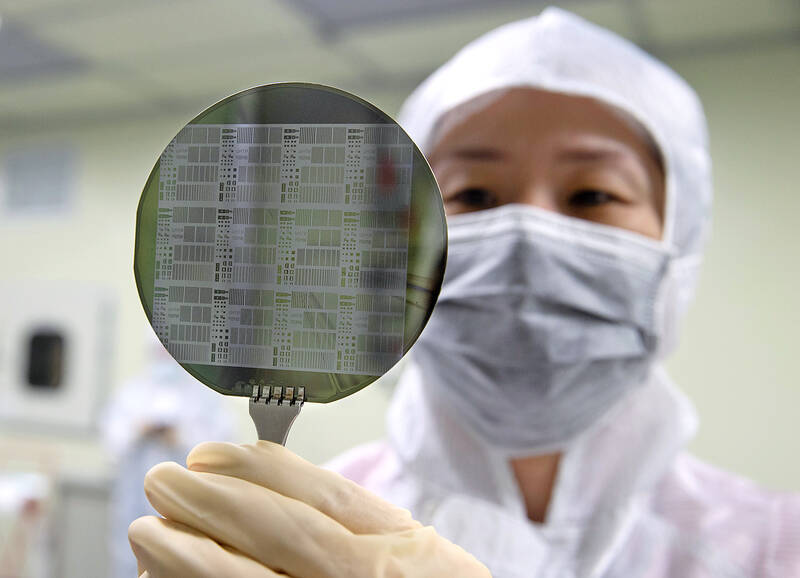Taiwan’s semiconductor industry could maintain its global lead for at least the next eight to 10 years, an analyst said on Tuesday, while an executive urged the government to ensure research security and to develop a “grand strategy” with changing supply chains in mind.
At a forum called “Taiwan in the Era of Techno-Geopolitics” in Taipei hosted by the think tank Research Institute for Democracy, Society and Emerging Technology (DSET), analyst Ray Yang (楊瑞臨) said he believes the nation’s semiconductor industry would maintain its competitive edge for another eight to 10 years.
However, while Taiwan’s lead in the commercial sectors of the industry — including manufacturing, design, packaging and testing — is unquestionable, it needs to establish strategies to ensure access to next-generation semiconductor technology, he added.

Photo: CNA
“Next year the industry will utilize 2-nanometer process technology, and I believe Taiwan will continue to dominate until at least the 9-angstrom generation,” said Yang, who works as consulting director at the Industry, Science and Technology International Strategy Center which is part of the Industrial Technology Research Institute.
One angstrom is one-10 of one nanometer, therefore the arrival of the 9-angstrom generation would mean even more advanced and precise technology is being used to produce chips.
However, so-called “next-generation semiconductors” are still coming, Yang said, referring to how semiconductor production would involve using new materials or ways of advancing efficiency when the limit of the existing technology is reached.
China has been trying to “overtake on a curve” by working on next-generation technology, the analyst said, adding that the US and Europe are also working toward the possible breakthrough.
“Taiwan has to work with other countries in conducting such research, but in the process of international collaboration, we will also have to protect our own research security,” he said.
SEMI global chief marketing officer and Taiwan president Terry Tsao (曹世綸) called on the government to formulate a “grand strategy” to ensure the future of Taiwan’s semiconductor industry.
Prior to the geopolitical landscape shift arising from the US-China trade conflict, companies could easily find their position in the industry without government assistance because there was a global division of labor, Tsao said.
“But now the supply chain reshuffle and geopolitical impact have made it necessary for the industry to work with the government,” he said.
Tsao also said that “narrative” is important for the global community.
“Our [semiconductor] industry was able to single-mindedly concentrate on excelling in manufacturing, but now, risks for the industry would arise if an international narrative in the direction of doubting relying on Taiwan too much develops,” he said.
Tsao said he believes the government and government-led think tanks should focus on formulating Taiwan’s own discourse.
“It should be highlighted that Taiwan can build a resilient partnership with other like-minded countries based on mutual trust,” he said.
“After all, it is not necessarily a good idea for the industry to replicate large-scale manufacturing,” Tsao said. “Companies may get lots of subsidies and suppliers may see a boost, but it could all result in ineffective overcapacity.”

Hon Hai Precision Industry Co (鴻海精密) yesterday said that its research institute has launched its first advanced artificial intelligence (AI) large language model (LLM) using traditional Chinese, with technology assistance from Nvidia Corp. Hon Hai, also known as Foxconn Technology Group (富士康科技集團), said the LLM, FoxBrain, is expected to improve its data analysis capabilities for smart manufacturing, and electric vehicle and smart city development. An LLM is a type of AI trained on vast amounts of text data and uses deep learning techniques, particularly neural networks, to process and generate language. They are essential for building and improving AI-powered servers. Nvidia provided assistance

DOMESTIC SUPPLY: The probe comes as Donald Trump has called for the repeal of the US$52.7 billion CHIPS and Science Act, which the US Congress passed in 2022 The Office of the US Trade Representative is to hold a hearing tomorrow into older Chinese-made “legacy” semiconductors that could heap more US tariffs on chips from China that power everyday goods from cars to washing machines to telecoms equipment. The probe, which began during former US president Joe Biden’s tenure in December last year, aims to protect US and other semiconductor producers from China’s massive state-driven buildup of domestic chip supply. A 50 percent US tariff on Chinese semiconductors began on Jan. 1. Legacy chips use older manufacturing processes introduced more than a decade ago and are often far simpler than

STILL HOPEFUL: Delayed payment of NT$5.35 billion from an Indian server client sent its earnings plunging last year, but the firm expects a gradual pickup ahead Asustek Computer Inc (華碩), the world’s No. 5 PC vendor, yesterday reported an 87 percent slump in net profit for last year, dragged by a massive overdue payment from an Indian cloud service provider. The Indian customer has delayed payment totaling NT$5.35 billion (US$162.7 million), Asustek chief financial officer Nick Wu (吳長榮) told an online earnings conference. Asustek shipped servers to India between April and June last year. The customer told Asustek that it is launching multiple fundraising projects and expected to repay the debt in the short term, Wu said. The Indian customer accounted for less than 10 percent to Asustek’s

Gasoline and diesel prices this week are to decrease NT$0.5 and NT$1 per liter respectively as international crude prices continued to fall last week, CPC Corp, Taiwan (CPC, 台灣中油) and Formosa Petrochemical Corp (台塑石化) said yesterday. Effective today, gasoline prices at CPC and Formosa stations are to decrease to NT$29.2, NT$30.7 and NT$32.7 per liter for 92, 95 and 98-octane unleaded gasoline respectively, while premium diesel is to cost NT$27.9 per liter at CPC stations and NT$27.7 at Formosa pumps, the companies said in separate statements. Global crude oil prices dropped last week after the eight OPEC+ members said they would